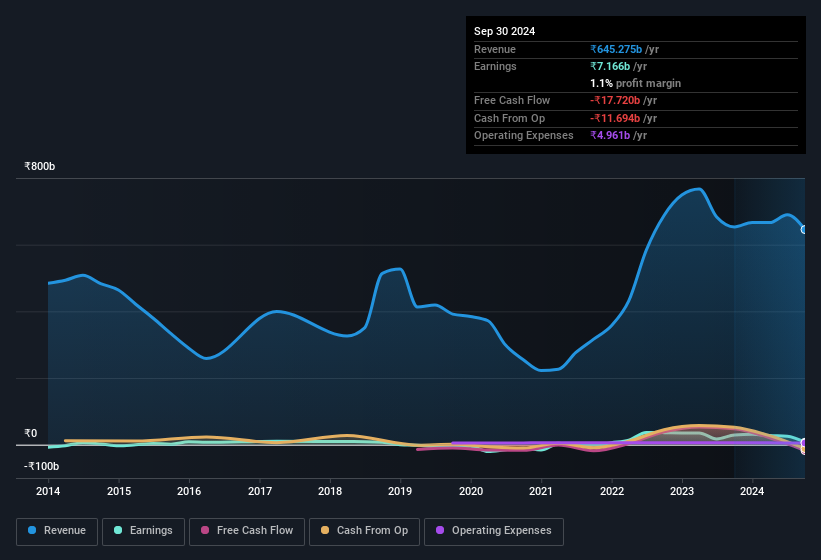- India
- /
- Oil and Gas
- /
- NSEI:CHENNPETRO
Chennai Petroleum's (NSE:CHENNPETRO) Anemic Earnings Might Be Worse Than You Think

Investors were disappointed by Chennai Petroleum Corporation Limited's (NSE:CHENNPETRO ) latest earnings release. We did some analysis, and found that there are some reasons to be cautious about the headline numbers.
Check out our latest analysis for Chennai Petroleum

Examining Cashflow Against Chennai Petroleum's Earnings
Many investors haven't heard of the accrual ratio from cashflow, but it is actually a useful measure of how well a company's profit is backed up by free cash flow (FCF) during a given period. The accrual ratio subtracts the FCF from the profit for a given period, and divides the result by the average operating assets of the company over that time. You could think of the accrual ratio from cashflow as the 'non-FCF profit ratio'.
As a result, a negative accrual ratio is a positive for the company, and a positive accrual ratio is a negative. That is not intended to imply we should worry about a positive accrual ratio, but it's worth noting where the accrual ratio is rather high. That's because some academic studies have suggested that high accruals ratios tend to lead to lower profit or less profit growth.
For the year to September 2024, Chennai Petroleum had an accrual ratio of 0.20. We can therefore deduce that its free cash flow fell well short of covering its statutory profit. Even though it reported a profit of ₹7.17b, a look at free cash flow indicates it actually burnt through ₹18b in the last year. We saw that FCF was ₹48b a year ago though, so Chennai Petroleum has at least been able to generate positive FCF in the past. The good news for shareholders is that Chennai Petroleum's accrual ratio was much better last year, so this year's poor reading might simply be a case of a short term mismatch between profit and FCF. As a result, some shareholders may be looking for stronger cash conversion in the current year.
That might leave you wondering what analysts are forecasting in terms of future profitability. Luckily, you can click here to see an interactive graph depicting future profitability, based on their estimates.
Our Take On Chennai Petroleum's Profit Performance
Chennai Petroleum didn't convert much of its profit to free cash flow in the last year, which some investors may consider rather suboptimal. Because of this, we think that it may be that Chennai Petroleum's statutory profits are better than its underlying earnings power. Sadly, its EPS was down over the last twelve months. The goal of this article has been to assess how well we can rely on the statutory earnings to reflect the company's potential, but there is plenty more to consider. So while earnings quality is important, it's equally important to consider the risks facing Chennai Petroleum at this point in time. Be aware that Chennai Petroleum is showing 5 warning signs in our investment analysis and 3 of those are potentially serious...
This note has only looked at a single factor that sheds light on the nature of Chennai Petroleum's profit. But there are plenty of other ways to inform your opinion of a company. For example, many people consider a high return on equity as an indication of favorable business economics, while others like to 'follow the money' and search out stocks that insiders are buying. So you may wish to see this free collection of companies boasting high return on equity, or this list of stocks with high insider ownership.
New: AI Stock Screener & Alerts
Our new AI Stock Screener scans the market every day to uncover opportunities.
• Dividend Powerhouses (3%+ Yield)
• Undervalued Small Caps with Insider Buying
• High growth Tech and AI Companies
Or build your own from over 50 metrics.
Have feedback on this article? Concerned about the content? Get in touch with us directly. Alternatively, email editorial-team (at) simplywallst.com.
This article by Simply Wall St is general in nature. We provide commentary based on historical data and analyst forecasts only using an unbiased methodology and our articles are not intended to be financial advice. It does not constitute a recommendation to buy or sell any stock, and does not take account of your objectives, or your financial situation. We aim to bring you long-term focused analysis driven by fundamental data. Note that our analysis may not factor in the latest price-sensitive company announcements or qualitative material. Simply Wall St has no position in any stocks mentioned.
About NSEI:CHENNPETRO
Adequate balance sheet second-rate dividend payer.
Market Insights
Community Narratives




